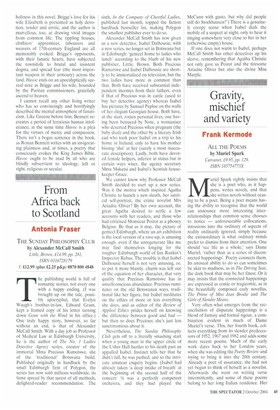From Africa back to Scotland
Antonia Fraser
THE SUNDAY PHILOSOPHY CLUB by Alexander McCall Smith Little, Brown, f14.99, pp. 281,
ISBN 0316728179 £12.99 (plus £2.25 p&p) 0870 800 4848
The publishing world is full of romantic stories, not every one with a happy ending. (I was brought up on the tale, possibly apocryphal, that Evelyn Waugh's brother-in-law, Edward Grant, kept a framed copy of his letter turning down Gone with the Wind in his office.) One truly happy story, however, so far without an end, is that of Alexander McCall Smith. With a day job as Professor of Medical Law at Edinburgh University, he is the author of The No. 1 Ladies Detective Agency series, creator of the immortal Mma Precious Ramotswe, she of the 'traditional' Botswana build. Published originally in hardback by the small Edinburgh firm of Polygon, the series has now sold millions worldwide, its fame spread by that surest of all methods, delighted-reader recommendation. The
sixth, In the Company of Cheerful Ladies, published last month, topped the fiction hardback bestseller list, making Polygon the smallest publisher ever to do so.
Alexander McCall Smith has now given us a new detective, Isabel Dalhousie, with a new series, no longer set in Botswana but in Edinburgh: 'genteel home to ladies who lunch' according to the blurb of his new publisher, Little, Brown. Both Precious Ramotswe and Isabel Dalhousie are shortly to be immortalised on television, but the two ladies have more in common than that. Both have received substantial independent incomes from their fathers, even if that of Precious was in cattle (used to buy her detective agency) whereas Isabel has pictures by Samuel Peploe on the walls of her elegant Georgian house. Both have, at the start, rotten personal lives, one having been betrayed by Note, a womaniser who deserted Precious when pregnant (the baby died) and the other by a literary Irish cad who took poor Isabel on a trip to his home in Ireland. only to have his mother hissing 'slut' at her (surely a most inaccurate description). Lastly, both have devoted female helpers, inferior in status but in certain ways wiser, the agency secretary Mma Makutsi and Isabel's Scottish housekeeper Grace.
We cannot know why Professor McCall Smith decided to start up a new series. Was it the motive which inspired Agatha Christie to launch a new sleuth, her satirical self-portrait, the crime novelist Mrs Ariadn e Oliver? By her own account, the great Agatha desired to settle a few accounts with her readers, and those who had criticised Monsieur Poirot as a phoney Belgian. Be that as it may, the picture of genteel Edinburgh, where an art exhibition is the local version of a rave-up, is amusing enough, even if the unregenerate like me may find themselves longing for the rougher Edinburgh world of Ian Rankin's Inspector Rebus. The trouble is that Isabel Dalhousie herself is not very amusing, or, to put it more bluntly, charm was left out of the equation of her character, that very quality that Precious Ramotswe has in unselfconscious abundance. Precious ruminates on the old Botsvvanan ways, traditional like her figure, but Isabel meditates on the ethics of more or less everything she does, and as editor of the Review of Applied Ethics prides herself on knowing the difference between good and bad — but then so does Precious; she's just less sanctimonious about it.
Nevertheless, The Sunday Philosophy Club gets off to a literally smashing start when a young man in the upper circle of the Usher Hall hurtles to his death past an appalled Isabel. Instinct tells her that he didn't fall, he was pushed, and so the intricate amateur enquiry begins. (Isabel had already taken 'a deep intake of breath' at the beginning of the second half of the concert: 'it was a perfectly competent orchestra, and they had played the McGunn with gusto, but why did people still do Stockhausen?') There is a genuinely creepy scene when Isabel dials the mobile of a suspect at night, only to hear it ringing somewhere very close to her in her (otherwise empty) house.
If one does not warm to Isabel, perhaps McCall Smith has other detectives up his sleeve, remembering that Agatha Christie not only gave us Poirot and the tiresome Ariadne Oliver but also the divine Miss Marple.


















































































 Previous page
Previous page